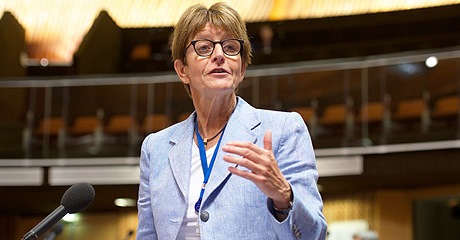“A proposal had been put forth for three draft resolutions on Nagorno-Karabakh before the adoption of the last decision of the PACE Committee on Political Affairs. And the PACE Bureau overwhelmingly voted for the adoption of one document by combining two of the three proposals. The last discussion on the Nagorno-Karabakh conflict was held at PACE in 2005. But this time, we are trying to strengthen relations and contacts between the Azerbaijani and Armenian delegations by adopting this decision, not to interfere in the OSCE Minsk Group’s work”, President of the Parliamentary Assembly of the Council of Europe (PACE) Anne Brasseur told while commenting on the proposal adopted by PACE Committee on Political Affairs on the development of a resolution titled escalation of the situation in Nagorno-Karabakh and other occupied territories and the appointment of a special rapporteur for this issue.
Anne Brasseur said the rapporteur for this issue has been appointed by a secret ballot at the committee.
“I wish our newly appointed rapporteur success and strong will in this job. Preparation of this report will be difficult enough. We’re talking about a conflict that has been lasting for a long time and needs to be resolved. At the same time, there are great emotional moments in this issue. We must need to look for possible solutions together in order to increase the chances of cooperation between the two countries’ delegations, parliaments, as well as government representatives in future by looking into the emotional situation and also the facts at the same time,” she said.
The PACE president added that she can’t say anything regarding to the form and context of the report: “The committee’s next meeting will take place in December in Paris. I think this issue can be considered at the meeting. Of course, I’m not familiar with the rapporteur’s work schedule and I wouldn’t like to meddle in his work. Because any appointed rapporteur is fully trusted by the committee and provided with all necessary freedom to do their work. I wish the rapporteur only success and strong will in this job”.
Brasseur also commented on the Armenian delegation’s objection to the appointment of a rapporteur and their statements that they will not cooperate with him in the future.
“I had a talk with the Armenian delegation last week. On the one hand, I understand their reaction, on the other hand, I think they have to stay and cooperate for the preparation of a fine balanced report. Because the purpose of the report is to define the positions of both sides. If we fail to see cooperation between the two sides, of course, there will be a lot of difficulties. Anyway, I hope they will agree to cooperate with the rapporteur,” she said.
Answering the question of APA’s correspondent about the possibility of imposing sanctions, which were imposed on the Russian delegation to PACE due to Ukraine crisis, on the Armenian delegation, Brasser stated that under the procedural rules, such measures can be taken against the delegation of any country.
“The next session of PACE will start in January. The powers of the delegations of all member states are confirmed at the first plenary meeting of each session. If there is an objection to the powers of any delegation, this issue can be discussed. The issue of sanctions against Russia can be reconsidered in January. If there is an objection to the powers of the delegation of any country, this issue is submitted to the PACE Committee on Rules of Procedure, which will be able to prepare a special report. These measures can be taken against all member states,” she said.
More about:















































